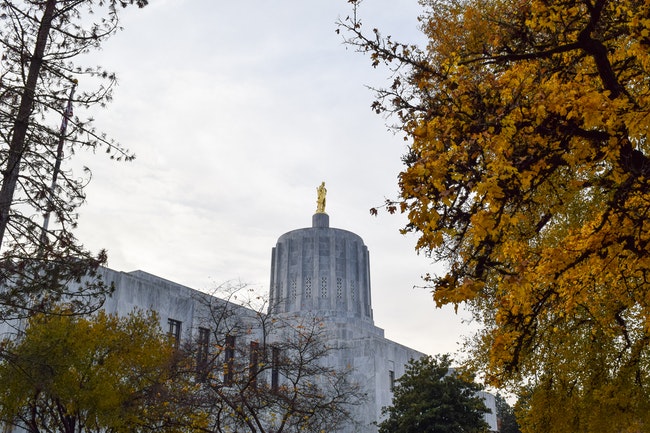 The Oregon State Capitol. (Saphara Harrell/Salem Reporter)
The Oregon State Capitol. (Saphara Harrell/Salem Reporter)
Oregon’s business taxes stand to go up more than 40% in the next two years because of corporate tax hikes, according to a new study funded by the state’s top corporate lobbyist.
The study indicates several new business taxes could propel Oregon, which has long had some of the nation’s lowest, above many of its western neighbors in the rankings. New corporate taxes on the ballot next month in the Portland area could raise operating costs again, which tax opponents warn would make the region less competitive in attracting and retaining employers.
And proposed taxes could give Portland the country’s highest personal income tax rate for wealthy residents, according to the study, with a top bracket of 14.6%.
“Cost matters,” said Sandi McDonough, CEO of Oregon Business & Industry, which paid for the new study. “We just can’t continue to layer new costs on businesses if we want them to continue to grow and bring new jobs to Oregon.”
Keith Wilson, CEO of Titan Freight Systems in Portland, said the study misrepresents businesses’ actual costs because it doesn’t factor in the federal tax cuts that took effect last year and substantially reduced overall taxes on corporations and wealthy individuals.
“Am I really paying more today than I was four or five years ago? The answer is pretty clearly no,” said Wilson, who is campaigning for a new transportation bond to fund road and service upgrades in the metro region.
The federal tax cuts have the effect of “transferring the burden to the local economies,” according to Wilson, whose company employs 90. He said businesses have a responsibility to help fund improvements to make Oregon a welcoming place for companies and their workers.
The biggest share of Oregon’s new taxes come from a corporate activity tax lawmakers approved last year for education funding. It seeks to raise more than $1 billion annually to fund educational improvements with a tax on gross receipts of larger businesses.
A 1% payroll tax to fund paid family medical leave, which takes effect in 2022, will add another $450 million in new costs, according to the study out Tuesday from consultants at Ernst & Young.
Businesses in the Portland area will be paying an additional $177 million in new taxes annually once a new income tax for housing and homeless services kicks in next year, Ernst & Young estimates. That total includes two smaller taxes that took effect in 2019 and 2020 – one to pay for clean energy programs in Portland and a Multnomah County business income tax.
Further, Portland area voters will consider new business taxes on the Nov. 3 ballot that Ernst & Young estimates could add another $352 million. Most of that comes from $300 million in annual payroll taxes that would be generated by Metro’s proposed $7 billion transportation bond to pay for light rail to Tigard, plus road and safety projects in the suburbs and underserved parts of Portland.
Oregon Business & Industry opposes the transportation bond and has contributed $55,000 to the campaign to defeat it.
Ernst & Young finds that if Portland voters adopt a ballot measure to pay for universal preschool with an income tax, Portland will have the highest personal income tax in the nation for top earners, 14.6%.
The vast majority of residents will pay lower rates because they don’t earn enough to qualify for the new, higher tax bracket. (Metro’s income tax for housing, for example, is levied on individual incomes over $125,000.)
Still, opponents warn the high tax rate could serve as a sticker shock that would drive wealthy executives with decision-making authority over their businesses to places with lower taxes.
“14.6% is a whole different ballgame,” said Nikki Dobay with the Council On State Taxation, an organization of large corporations that monitors tax policy. “That’s when companies really start to take notice.”
Oregon has few large corporate headquarters inside the state and many executives of companies nominally based here actually live elsewhere. It’s not clear income taxes are the reason why, though. The CEO of Portland software company Puppet, for example, lives in San Francisco – where personal income taxes are currently higher.
And it’s not evident that Oregon’s rising tax burden is driving employers away, at least not so far. Nearly all the Oregon headquarters that have left the state in the past several years did so after buyouts from larger competitors, who generally retained the local operations.
Oregon approved its paid family and medical leave bill and its new education tax in 2019 without any sign employers were moving away in substantial numbers. Oregon’s jobless rate was hovering around 3.5% for many months before the pandemic, the lowest point on record, and remained below the national rate in August.
NOTE: This story is published with the permission of The Oregonian/OregonLive as part of a collaborative of news organizations in Oregon sharing news content. Salem Reporter is part of the arrangement.









